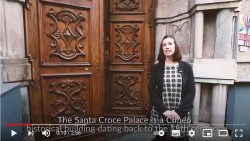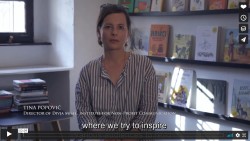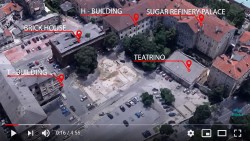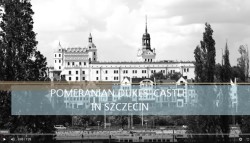PILOT ACTIONS - success stories
Get to know four pilot sites where the ForHeritage approach have been adopted!
Pilot project in Italy: the Palazzo Santa Croce in Cuneo
The main aim of the Italian pilot site was to experiment a new management and funding scheme, based on a public-private partnership, for the rooms located at the ground floor of the Palazzo Santa Croce, through a collaborative process. The main challenge the pilot project had to face was the fact that the whole building is under a transition phase. In fact, one portion of the Palazzo Santa Croce has already been restored, while the remaining portion is going through a deep renovation process that will probably last for some years. Any management project of the rooms located at the ground floor has to co-live with such a transitory situation and has to evolve together with the evolution of the whole building that will host the Civic Library from 2025. On the whole project level, the Italian pilot action represented a case study of a difficult situation, that could be solved through the right involvement of stakeholders and through adopting a different approach to the management. That was exactly what ForHeritage aimed at: overcoming difficulties and fear for some new and integrated approaches in order to test new forms of management that see the public and the private actors working together for the same purposes. The testing proved to be somehow difficult but represented also a learning process for the whole municipality. The pilot action in Cuneo had a positive outcome: it helped the City of Cuneo in finding a potential private manager of the pilot site and the pilot project represented an important learning experience. The pilot action has an important impact on the municipality because it forced it to activate a new approach.
Pilot project in Slovenia: Vodnik Homestead in Ljubljana
The pilot in Slovenia was focused on testing the impact design and investment model for non-profit cultural products of the public institute Divja misel, which manages Vodnik homestead, a house of reading, writing, and storytelling, and a prominent historical site owned by the City of Ljubljana. The institute established a laboratory project Fairytale studio, which explores how children and adults communicate and learn through stories. The studio developed educational tools intended to help professionals in education to incorporate storytelling into their teaching process. The main challenge of the pilot project was to link these market-oriented products with private funds. The project's main objective is to acquire additional private funds to improve the financial situation of Vodnik’s Homestead by analyzing the current financing situation, identifying potential alternative financial sources, and testing one of them. Analyzing, selecting, and acquiring private funds pilot project contributes to the main objective of the ForHeritage project, which is to build upon the results of previous projects, bringing them to the implementation phase and putting them together in order to foster an integrated approach to heritage management in the various stages of planning, implementation, and financing. The pilot linked Fairytale studio with potential strategic partners and defined the most probable and feasible donor. As a result, the pilot site manager signed a grant agreement with a strategic donator to support the launch of the educational tools. By combining seed private investment capital with public financial sources, the pilot contributed to the long-term strategic partnership needed for making these tolls sustainable on the market. That is an experimental approach because private financing of cultural activities with social impact is a novelty in Slovenia. Therefore, represents a demonstration approach to other organizations in the third sector on how to obtain private financing.
Pilot project in Poland: the Pomeranian Dukes' Castle in Szczecin
Activities conducted within ForHeritage allow for the conclusion that the Pomeranian Dukes' Castle in Szczecin has the potential to become a frequently visited place and one where people staying in it will spend more time than now. For this to happen, certain conditions must be met, which include additional attractions, e.g. in the form of a multimedia exhibition room, but also creating a space for relaxation with catering points. In addition, the creation of additional space in the Castle should be linked to marketing activities that will ensure effective communication with individual groups of stakeholders. In the course of the project, a preliminary concept for the development of the new space was proposed and analysed in three variants, differing in the size of the commercial component. As part of the implementation of the management plan, the Board of the West Pomeranian Voivodeship, whose organizational unit is the Pomeranian Dukes' Castle, once again adopted a participatory model for the preparation of documents related to the implementation of EU funds in the 2021-2027 financial perspective. Pomeranian Dukes' Castle plans to obtain external funding for the organization of multimedia exhibition rooms in according with management plan. Struggling with difficulties such as the effects of a construction disaster, restrictions in the organization of events and the admission of visitors as a result of the Covid-19 pandemic, or the lack of non-refundable funds available and too low revenues in the last few years to use the funds available but not advanced, the Castle is set to introduce necessary changes.
Pilot project in Croatia: the Bencic Complex in Rijeka
The main challenge in the Bencic Complex in Rijeka has been the involvement of directors of different, already established institutions in the establishment and management of the cultural quartier, for which their close cooperation, management of a shared external space, and joint efforts for branding are needed. An additional challenge is branding of the area, in order to attract more locals and tourists to this currently not very frequented part of the city. The pilot action in Rijeka, as a first pilot in Croatia of that type, with the aim to combine public administration and public-private initiative, has contribute to the bounding of cultural institutions and stakeholders along with the public space. The basis is the management model developed in ForHeritage project. The management plan defines a potential structure: establishing a new independent city institution, a new external general director, or a circular director. Cultural institutions within the Department of Culture plan to apply to a new EU programme scheme. A combination of public financing and private sources will be an additional funding model.Disseminated results will enable cultural institutions in region and its surroundings to improve their actions. The development of cultural offers of new forms of cultural heritage products/services will increase future economic benefits.
Project video presenting the pilot site in Italy: the Palazzo Santa Croce in Cuneo:

Project video presenting the pilot site in Slovenia: the Vodnik Homestead in Ljubljana (the video was produced within the Forget Heritage project, Interreg Central Europe):

Project video presenting the pilot site in Croatia: the Benčić Complex in Rijeka:

Project video presenting the pilot site in Poland: the Pomeranian Dukes' Castle in Szczecin:

